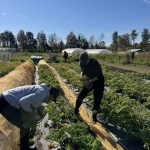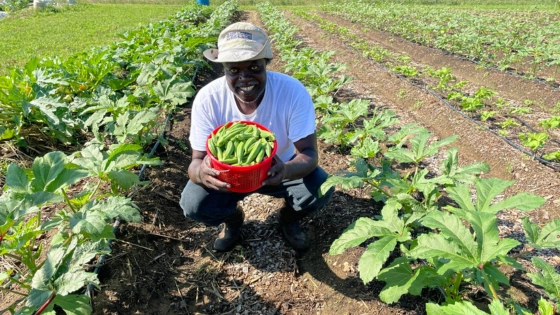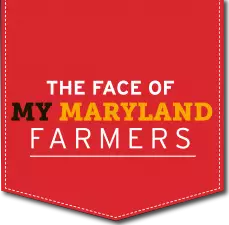 Asawana Farms isn’t just a place where vegetables grow; it’s a hub for community, culture and health. Located in Upper Marlboro, this half-acre urban farm specializes in culturally significant African and Caribbean crops, operating on a powerful principle: “Food is Medicine.” By connecting nutrition with cultural heritage, Asawana Farms is cultivating more than just produce.
Asawana Farms isn’t just a place where vegetables grow; it’s a hub for community, culture and health. Located in Upper Marlboro, this half-acre urban farm specializes in culturally significant African and Caribbean crops, operating on a powerful principle: “Food is Medicine.” By connecting nutrition with cultural heritage, Asawana Farms is cultivating more than just produce.
At the heart of this mission is Isaac Zama, the founder of Asawana Farms. For him, farming has always been a part of his life. “I grew up in Cameroon and farming was the only thing that we did as kids besides going to school and playing soccer,” he says. “As kids, we would follow our mom to the farm, and in that process, I learned how to farm.” This early experience planted a seed that would follow him to the United States, where he always maintained a personal garden.
The turning point came three years ago when he discovered the Watkins Park Incubator program through the Urban Farming Institute (UFI). “I have always wanted to own a farm, but land ownership was a huge challenge,” Isaac says. “The UFI gave me an opportunity to practice what I knew growing up in Cameroon and farming, and what I studied in school. It was one of the best things that ever happened to me.”
This opportunity allowed him to transition from gardening for himself to growing for a community. The program provided the land and resources for Isaac to learn the “whole nine yards of commercial farming,” from producing compost to managing pests naturally. “Being part of the UFI opened my eyes to lots of things — producing my own compost, learning about food safety, soil health, and growing in buckets, vertical gardens and in grow bags,” Isaac says.
Asawana Farms grows specialty vegetables that hold cultural and medicinal value. On his half-acre plot, Isaac grows bitter melon, scotch bonnet peppers, African eggplant, bitter leaf, okra, ugu (fluted pumpkin), ewedu (jute leaf) and callaloo.
His decision to focus on these crops was intentional. “With the latitude given us at the UFI to grow whatever we wanted, I decided to grow specialty vegetables that have medicinal value from the continent,” Isaac says. “I try to be a bridge between the motherland and African Americans through food.”
The farm’s mission is rooted in the “Food is Medicine” principle, highlighting crops known for their health benefits. Produce like bitter leaf, okra and African Scent Leaf are recognized for properties that could help regulate blood sugar and support liver and immune functions.
Isaac is passionate about sharing this knowledge. Visitors to the farm are given tours and invited to taste the produce. “We then inform them about the medicinal benefits of bitter leaf, Ugu, African Eggplant and African Scent leaf,” he says. “We encourage everyone to go home and do research for themselves.”
Sustainability is a core practice at Asawana Farms. The farm follows regenerative organic practices that restore soil health, enhance biodiversity and avoid synthetic chemicals, such as composting, crop rotation, cover crops and natural pest management.
This commitment extends beyond the soil and into the community. Asawana Farms partners with the University of Maryland Capital Region Medical Center, supplying fresh produce for its “Food is Medicine” program, which provides medically tailored produce to patients.
Education is also central to the farm’s work. Asawana Farms hosts volunteer days, workshops and tours to teach residents how to grow and use these culturally relevant vegetables. The farm has become a learning ground for high school and college students seeking community service hours, with over 300 community members volunteering over the years.
Isaac’s vision has created a small urban farm that doesn’t just grow food — it grows a healthier, more connected community.
Hungry for more? Read about UFI. Learn more about soil health.

